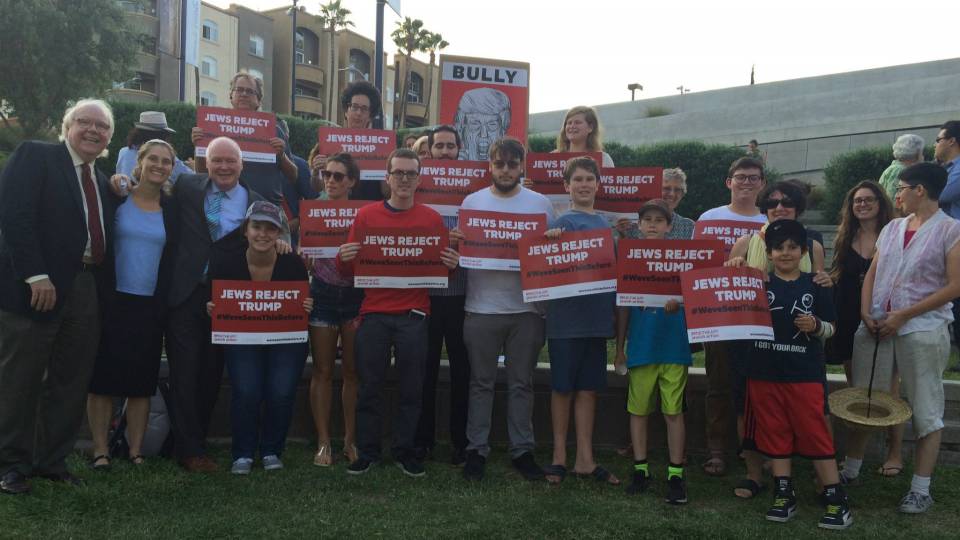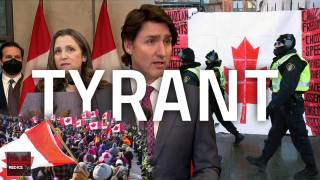Haaretz: 'Time to Form an American Jewish Emergency Committee Against Donald Trump'
The Jewish community is growing increasingly desperate as the possibility of a Trump presidency looms ever closer.
In dangerous times, American Jews have a tradition of forming “Emergency Committees.” In 1939, fearing that World War II would imperil the activities of the London and Jerusalem-based World Zionist Organization, representatives of America’s major Zionist groups formed the Emergency Committee for Zionist Affairs. Later renamed the American Emergency Committee for Zionist Affairs and then the American Zionist Emergency Council, it operated until the establishment of the State of Israel. Meanwhile, in 1943, Ben Hecht and Peter Bergson created the Emergency Committee to Save the Jews in Europe to pressure Franklin Roosevelt’s government to do more to rescue Jews engulfed by the Holocaust. In 2010, Weekly Standard editor William Kristol and some like-minded conservatives created the Emergency Committee for Israel to support Benjamin Netanyahu’s hawkish agenda.
It's true: this isn't the first time Jews have rallied against the ethnic interests of the goyim. In fact, they've been doing this for quite some time. Why? Because Jews, like all groups except for modern Whites, do what is in their best interests.
While on the subject of history, though, it's worth noting that there was a significant amount of Zionist-National Socialist cooperation during World War II. The Haavara Agreement, signed between the Third Reich and the Zionist Federation of Germany, established a program through which German Jews could emigrate to Palestine. Interestingly, the Zionist Federation of Germany submitted a document to Hitler's office in which they proclaimed that "Zionism believes that the rebirth of the national life of a people, which is now occurring in Germany through the emphasis on its Christian and national character, must also come about in the Jewish national group. Our acknowledgment of Jewish nationality provides for a clear and sincere relationship to the German people and its national and racial realities."
Such cooperation is a matter of historical fact. Nevertheless, far-left UK politician Ken Livingstone was suspended from the Labour Party for merely acknowleding this.
The Haaretz article continues:
But more than a year since Donald Trump announced his presidential candidacy, and several months since he became the presumptive Republican nominee, there is still no American Jewish Emergency Committee against Fascism (or bigotry, or whatever name you choose to describe Donald Trump’s attacks on American Muslims, Mexican immigrants, an independent judiciary and a free press).
I hadn’t thought about this absence until last Shabbat, when an idealistic young Orthodox rabbi named Joshua Frankel came up to me during Kiddush and proposed creating one. His vision is to create a network of rabbis and lay leaders across the country so that wherever Trump speaks, there is always someone to protest, in Judaism’s name.
It's interesting that the author uses the phrase "Mexican immigrants" instead of "illegal immigrants". While we all know that Trump only intends to deport criminals who crossed the border illegally, such phrasing would suggest that Trump wants to deport all Mexicans. This intentionally deceptive use of language is indicative that the author has no regard for accuracy or honesty in his assessment of Trump's immigration policy.
Regarding Muslims, it's amusing how American Jews can condemn Donald Trump for his anti-Muslim rhetoric – all while supporting Israel's policies towards Muslims, which, ironically enough, include a massive wall to keep them out.
This glaring double standard is an integral part of understanding Jewish influence; Jews generally support diversity and multiculturalism in the West, but support Jewish supremacy in Israel. A New York Times article on the subject affirms that "Israel’s policy toward African asylum seekers is to pressure them to self-deport or, as the former interior minister Eli Yishai put it, to 'make their lives miserable' until they give up and let the government deport them."
And, despite the fact that the Israeli government directly supports the third world invasion of Europe, Benjamin Netanyahu has cited the influx of non-Jews into Israel as a massive exisential threat to Jewish identity.
As the Haaretz article states, Jewish efforts to thwart Trump's ascencion have been underway for quite some time:
Of course, some American Jewish groups have already criticized Trump. The Forward’s Nathan Guttman reports that between last December and this May, the Anti-Defamation League condemned Trump’s statements at least five times. The American Jewish Committee called his proposed registry of American Muslims a “horror movie that we Jews are quite familiar with.” The Religious Action Center of Reform Judaism organized a walkout of Trump’s speech at AIPAC. The Jewish social justice group Bend the Arc led anti-Trump protests just this week. And earlier this month, four prominent rabbis—one Orthodox, one Conservative, one Reform and one Reconstructionist—jointly declared that “Men and women of faith should indeed form a coalition to denounce the racism and bigotry that Trump spews forth and inspires.”
These protests are laudable. But they’ve been episodic. Frankel’s idea is to create something continuous, a protest that does not end until Trump’s presidential bid does. By challenging Trump wherever he goes, rabbis could use his campaign to rouse their own communities against bigotry. After protesting a Trump rally, some might take their congregants to a solidarity event at a local mosque. Others might help immigrants register to vote. The goal would be a rolling mobilization in which thousands or tens of thousands of American Jews join the struggle to defeat the most openly bigoted and authoritarian major party nominee in modern American history.
Such a mobilization would counter the shameful acquiescence to Trump in some corners of the American Jewish establishment. It would counter AIPAC’s decision to invite Trump to speak, the Conference of Presidents of Major American Jewish Organizations’ failure to issue a single press release condemning him and Sheldon Adelson’s pledge to spend as much as $100 million helping him get elected.
Perhaps a significant portion of the American Jewish community does in fact fear the possibility of Trump loading them onto cattle wagons. Nevertheless, the source of Jewish angst over the potential of a Trump candidacy stems from other factors.
The first is that the Jews correctly see Trump for what he is: an unapologetic, bombastic White man representing White interests, albeit implicitly. Can you imagine the uproar if Trump said something as innocuous as "I'm going to secure the White vote"? Explicitly advocating for White people would be inconveicable – despite the fact that Whites founded America, constitute the largest ethnic/racial group in the country, and that similar appeals to minorities are considered well and good. Sadly, our situation is such that even implicit appeals to White interests are met with condemnation.
The second, and perhaps most dangerous, aspect about Trump is that he is not beholden to Jewish donors or lobbyists. In other words, he's a wildcard. He could be very good for Israel, or he could sever foreign aid and leave the Israelis to fend for themselves. With nearly every other candidate openly pandering to Jewish/Israeli interests, Donald Trump is the last person the international Jewish community wants at the helm of America.
Keeping both this and Israel's position on immigration in mind, the article's rhetoric appears undeniably insincere:
It would show that American Jews take seriously the Torah’s 36 injunctions to remember the stranger because we were strangers in the land of Egypt. And it would put Jews on the right side during a moral crucible that Americans will remember for decades. Mexicans and Muslims will not always be the reviled outsiders they are in America today. One day, the children and grandchildren of the people Trump is demonizing will be highly integrated and politically influential and they will remember who defended their communities when they were under siege.
In defending Mexicans and Muslims, American Jews will also be defending ourselves. Trump is a bigotry entrepreneur. He looks for racial, ethnic and religious resentments that are being underserved by the political class. Today, Jews are not a primary target of those resentments. Nonetheless, Trump’s supporters have generated more public Jew-hatred than any campaign in decades. If you loathe “hyphenated Americans” and yearn to restore the hierarchies of 1950s America, chances are Jews may bother you too.
Oddly, the author's conclusion is surprisingly candid:
In the mid-twentieth century, American Jews participated in the civil rights movement in astonishing ways. The American Jewish Committee funded the research into the effects of segregation by African American psychologists Kenneth and Mamie Clark that helped sway the Supreme Court in Brown versus Board of Education. In the 1940s, notes J.J. Goldberg in his book, Jewish Power, the American Jewish Congress employed seven lawyers working to fight segregation, more than either the Justice Department or the NAACP.
The reason was enlightened self-interest. American Jews knew that, as a conspicuous minority with a history of persecution, they would benefit immensely if America became a more equal, tolerant society. Conversely, they knew that if African Americans failed in their struggle for equal citizenship, Jews might also fail in theirs.
The same is true today. An election like this comes along once or twice a lifetime. Let the Trump campaign be an opportunity for American Jews to show our children the kind of people we still are.
And there you have it! Such admissions are rare, but they illustrate the fact that Jews knowingly push for diversity and multiculturalism in the West because it benefits them. Because they see ethnic Europeans as their primary adversaries, they are willing to promote the interests of minority groups to diminish White power and influence. That they support diversity, minority rights, and multiculturalism in America – but vehemently oppose them in Israel – is a damning realization indeed.
Regarding this duplicitous double standard, Stanley Hornbeck, in his review of Dr. Kevin MacDonalds The Culture of Critique, summarizes the issue with remarkable clarity:
Prof. MacDonald's most profound charge against Jews is not ethnocentrism but dishonesty – that while claiming to be working for the good of mankind they have often worked for their own good and to the detriment of others. While attempting to promote the brotherhood of man by dissolving the ethnic identification of gentiles, Jews have maintained precisely the kind of intense group solidarity they decry as immoral in others.
Prof. MacDonald claims that one of the most consistent ways in which Jews have advanced their interests has been to promote pluralism and diversity – but only for others. Ever since the 19th century, they have led movements that tried to discredit the traditional foundations of gentile society: patriotism, racial loyalty, the Christian basis for morality, social homogeneity, and sexual restraint. At the same time, within their own communities, and with regard to the state of Israel, they have often supported the very institutions they attack in gentile society.






















